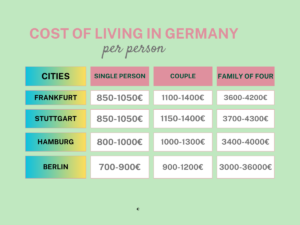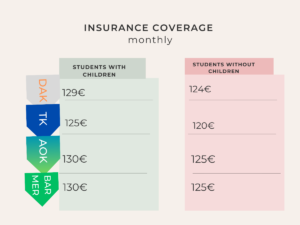
Anyone who wants to move to Germany must consider the cost of living in Germany. Germany offers a moderate cost of living as compared to other countries. Generally, major cities like Berlin, Munich, and Hamburg have higher costs for accommodation, transportation, health care, clothing & shoes, utilities, and sports & leisure. The cost of living in Germany depends mainly on the area you live in and your lifestyle choices. In general, the average cost of living per person in Germany is shown in the table below.
Single Person | Couple | A Family of Four |
980€ | 2000-3000€ | 3,334.6€ |
Is Germany expensive?
Germany’s Inflation rate has stabilized around +1.8% according to recent economic forecasts.
The inflation rate is measured as the year-over-year change in the consumer price index (CPI). However, Germany is still the most affordable country. In Germany, cities in the south and west are more expensive than those in the north and east. Especially major cities, such as Munich, Stuttgart, Frankfurt, and Hamburg, are more expensive than Berlin. Munich is the most expensive in 2012: 41€ for a single person and 4779,94€ for a family of four; however, for a couple, you can expect around 2500€ to 3500€, depending on your lifestyle.
City-Wise Cost of Living in Germany (2025 Estimates):

Cost of Living for the Non-student population in Germany
Germans mostly spend their income on housing, utilities, groceries, and transportation. The average cost of living in Germany is nearly 1000 to 1200€ for a single person or couple, but your lifestyle choices affect this cost of living.
To give you a clear picture, here’s a breakdown of living expenses.
Groceries
List of Items | Munich | Berlin | Hamburg | Frankfurt | Stuttgart |
Milk 1litr White bread Rice 1kg Eggs (12) | 1.16€ 2.28€ 2.73€ 3.22€ | 1.13€ 2.00€ 2.81€ 3.18€ | 1.08€ 1.98€ 2.81€ 3.59€ | 1.08€ 1.97€ 2.77€ 3.42€ | 1.08€ 1.94€ 2.76€ 3.47€ |
Apples Banana Tomato 1kg Onion Potato | 2.81€ 1.65€ 3.18€ 1.73€ 1.80€ | 2.72€ 1.62€ 3.38€ 1.75€ 1.67€ | 2.73€ 1.52€ 2.59€ 1.87€ 1.71€ | 2.73€ 1.38€ 3.25€ 1.55€ 1.44€ | 2.71€ 1.37€ 3.07€ 1.61€ 1.51€ |
Water 1.5 litr Wine bottle Beer Cigarettes | 0.90€ 5.99€ 0.86€ 8.20€ | 0.86€ 5.99€ 0.89€ 8.20€ | 0.90€ 5.99€ 0.94€ 8.20€ | 0.77€ 5.99€ 0.86€ 8.20€ | 0.80€ 5.99€ 0.86€ 8.20€ |
Chicken Beef Fish | 12.98€ 17.40€ 10-20 € | 10.95€ 16.00€ 12€ | 14.42€ 17.20€ 10-20€ | 13.12€ 17.10€ 10-20€ | 14.78€ 16.86€ 10-20€ |
Accommodation
- Renting in Germany is different. It’s really necessary to understand the terminology.
- If an apartment is advertised as a 2-bedroom apartment, it means it would have 1 living room and 1 dining room. On the other hand, the kitchen and bathroom are not classified as rooms.
- One important thing to consider is the square meter. For example, if you are single, you would need 12 square meters; for a couple, 24 square meters; and for a couple with a baby, at least 31 square meters.
| Type of Apartment | Munich | Berlin | Hamburg | Frankfurt | Stuttgart | ||
|---|---|---|---|---|---|---|---|
| 1 bedroom apartment in city center | 1,455.21€ | 1,283.73€ | 1,028.83€ | 1,205.92€ | 1,063.24€ | ||
| 1 bedroom apartment in suburb area | 1,19.77€ | 886.94€ | 763.88€ | 882.40€ | 800.00€ | ||
| 3 bedroom apartment in city center | 2,068.75€ | 2,328.22€ | 1,902.07€ | 2,007.50€ | 1,770.44€ | ||
| 3 bedroom apartment in suburb area | 2,068.75€ | 1,764.52€ | 1,394.33€ | 1.470.00€ | 1,4096.67€ | ||
| Rent of Apartment per square meter | |||||||
| Furnished 45 m2 apartment in city center | 1,089€ | 911€ | 992€ | 914€ | 865€ | ||
| Furnished 45 m2 apartment in suburb | 1,620€ | 1,291€ | 1,392€ | 1,418€ | 1,028€ | ||
| Furnished 85 m2 apartment in city center | 2,015€ | 1,654€ | 1,361€ | 1,467€ | 1,303€ | ||
| Furnished 85 m2 apartment in suburb | 2,517€ | 2,355€ | 1,741€ | 1,907€ | 1,614€ |
Student Accommodation or Dormitories
About 40% of international students live in Student dormitories (Studentenwohnheime), which are reasonably priced, frequently furnished, and extremely popular accommodation alternatives for students.
Cost:
Generally, the cheapest option ranges from €150 to €400 per month.
Types:
1: Student Residences (Halls of Residence): Affordable rooms, often with shared amenities.
2: Student apartments are more private, compact, and self-contained.
Important Information:
Mixed-gender dorms are shared. To locate and apply for these, it is advised to visit the DAAD resources or websites of the particular university city.
Utilities
- Utilities in Germany include electricity, heating, cooling, water, and garbage. In Germany, everyone must pay for these basic utilities monthly. In general, you need to decide on an internet package and its average cost. The monthly package with unlimited data and 50 Mbps speed for a single person costs 50€ on average.
- On the other hand, the electricity bill is separate, and you have to pay a monthly package fee. At the end of the year, electricity consumption will be calculated and compared with your payments. If you use less electricity, you will receive a refund for the difference; otherwise, you will need to pay it. The cost of the electricity package depends on your city. For one person, the average is between 35 € and 55 €. For a family of three, it will range from 50 € to 70 €.
- However, the cooling, heating, and garbage systems are included in the overall rent of the house, though this may vary depending on the city and housing society where you live. Some housing societies charge for garbage separately. Overall, the utility bill for a person is 147,66 €, and for a family, 227,30 €. In addition, the following table compares utility bills in major cities in Germany.
Type of Utilities | Munich | Berlin | Hamburg | Frankfurt | Stuttgart |
Utility bill for 1 person | 158,40€ | 147,66€ | 151,24€ | 157,50€ | 137,81€ |
Utility bill for Family | 246,99€ | 235,36€ | 235,36 | 244,31€ | 213,88€ |
Monthly Internet plan 50mps & unlimited | 40,36€ | 39,11€ | 35,53€ | 38,84€ | 37,94€ |
Monthly internet 60MPS unlimited data | 37,62€ | 41,72€ | 41.30€ | 40.04€ | 44,97€ |
Monthly Mobile package 10GB + Data | 21,04€ | 18,09 | 24.38€ | 21.30€ | 23.99€ |
Radio Fee
The radio fee is mandatory and is a unique system in Germany for funding public broadcasting known as the “Rundfunkbeitrag”. Whether the homeowner uses the radio or television, they have to pay for it. The federal states determine the amount that needs to be paid. Currently, this amount is 18.36 € per household per month. The Radio fee can be paid monthly or yearly. It also allows customers to pay for three months at once, which would be nearly 55€. There are also reductions available for those in need, such as people with disabilities and those living in shared accommodations.
Health insurance
In Germany, there are two types of health insurance: public and private.
The decision to choose public or private health insurance depends on annual income or whether you are self-employed or not. The significant differences between them are the following.
Public Health Insurance:
- In Germany, almost 90% of the population is covered by public health insurance, a required, solidarity-based system in which employer and employee contributions (around 14.6% + an additional fee) are divided equally.
- It offers complete coverage for medical appointments, hospital stays, and dental treatment and is required for workers making less than €73,800 annually (as of 2025).
- The major difference is that everyone living in Germany can be a member and get benefits.
- How much you need to pay depends on your salary. Contribution increases as you earn more.
- Self-employed persons have to cover the full cost, and premiums can reach up to 1.050.53 a month, which you share with your employer.
- Public insurance does cover dermatology & dentistry (with limits).
- Some public health insurance providers in Germany include Barmer, TK, DAK, and AOK.
Private Health Insurance:
- For about 10% of Germans (self-employed, high earners, and civil servants), private health insurance provides customized, faster access to care; however, premiums increase with age, and bills must be paid in full.
- Employees earning above 69,300 € are considered self-employed and are eligible for private insurance. Additionally, students are also eligible for it.
- In private health insurance, the monthly premium is not salary-dependent but rather depends on your health status and the date of your plan entry.
- More coverage or benefits compared to public health insurance.
In addition, health insurance contributions consist of:
- Health insurance amounts to 14.6% of the salary.
- Provider-specific additional contribution, which is 1.2% to 2.7% of your income.
- Long-term care insurance, which is 3.4% of your salary or income.
- However, it would be different for a person with children.
Health insurance contribution depends on some factors such as:
1: Students under the age of 30 years
If you are a student, then you would get benefits. Students would pay a reduced price if they are under 30, but it also depends on their income. Health insurance coverage for students, with and without children, under 30 years old, is provided below.

2: Voluntarily insured
A student over 30 years old could be eligible for voluntary insurance. Then the contribution would depend on the income. The minimum contribution is 220,00€ per month. If your yearly income exceeds 69,300€ or 30,000€ as self-employed, then you are eligible for private insurance.
3: Above 2000 Income
Generally, if your income is above 2000€, then you and your employer pay 50% of the contribution.
4: Income between 538 and 2000
If you are a midi-jobber, then you will get relief, and you will need to pay less. Your contribution will be lower than your employer’s.
5: Mini Jobber or employee with pay under 538€
In Germany, “Mini-Jobs” are part-time jobs with earnings below a certain threshold (€538 according to 2024–2025). Mini-jobbers have limited social security contributions. It means they generally don’t contribute to unemployment insurance and long-term care insurance.
6: Health Insurance:
Mini-jobbers are not automatically covered by statutory health insurance through their employment. They need to secure health insurance coverage through other means. If eligible, they can be covered under their spouse or partner’s health insurance.
Travel
Germany, with its rich history, vibrant culture, and stunning landscapes, is a popular destination for travelers. However, the cost of travel within the country can vary significantly. We will explore travel expenses for both students and non-students in Germany. A monthly travel ticket usually costs 105€ or more which is quite expensive.
- Deutschland Ticket: Fortunately, Germany introduced the Deutschlandticket in 2023. It is a nationwide monthly public transport ticket. For €49 per month, it allows unlimited travel on local and regional public transport throughout Germany, including buses, trams, subways, and regional trains (excluding long-distance trains like ICE, IC, and EC). However, from January 2025, the Deutschland ticket will cost €58 per month. A special student version of the Deutschland ticket is available at a reduced price of €29.40 per month.
- Regional Monthly Tickets: Many regions in Germany offer their own monthly tickets for travel within their respective transport networks. These tickets are often more affordable than the Deutschland ticket, especially for those who primarily travel within a specific region. You can check with the local transport authority (Verkehrsverbund) in your area for particular options and prices.
Company Travel Passes: Some employers offer subsidized or free public transportation passes as part of their employee benefits.
Food and Drink
Germany offers a delightful culinary scene, but it’s essential to budget wisely. Groceries are generally affordable, with staples like bread, milk, and produce readily available.
- You can get a simple lunch under €15, while a fast-food combo costs around €10. For a taste of local flavors, consider indulging in a hearty German meal at a traditional restaurant, though expect to spend €20-40 per person.
- Beer, with its vast selection, is the most popular drink in Germany. A domestic beer at the supermarket costs around €1.14, while a bottle of good quality red wine can range from €7 and upwards. By exploring local markets, cooking some meals at home, and taking advantage of budget-friendly options like street food and cafes, you can savor the German culinary experience without breaking the bank.
Wages and salary in Germany
Germany boasts a strong economy, which is reflected in its competitive salaries. While living costs can vary, German workers generally enjoy a good standard of living. Salaries are influenced by factors such as industry, experience, and location. High-tech sectors, finance, and engineering typically offer higher wages compared to industries like hospitality or retail.
Key factors shaping the German salary landscape include a robust minimum wage (€12.41 per hour), strong collective bargaining agreements, and a progressive income tax system. While major cities like Munich and Frankfurt tend to have higher salaries, Germany offers competitive wages across many sectors, contributing to its strong economy and high quality of life. However, in Germany, salaries are typically expressed as “Brutto” (gross pay) and “Netto” (net income).
- Brutto: This refers to the total amount earned before any deductions are made.
- Netto: This is the amount of money you receive after taxes (income tax, church tax) and social security contributions (health insurance, pension, unemployment insurance) have been deducted.
Germany has a progressive income tax system, meaning the tax rate increases as income rises, the primary tax on income earned by individuals. Tax rates range from 14% to 45%, with higher earners paying a higher percentage.
- Social Security Contributions (Sozialversicherungsbeiträge): These contributions fund social security programs such as health insurance, pensions, and unemployment insurance. Both employees and employers contribute to these programs.
- Other Taxes: Value Added Tax (VAT): A consumption tax added to the price of most goods and services.
Education
In Public universities, tuition fees are generally minimal or non-existent, and students typically pay a semester contribution. This covers administrative costs and student services, often including a public transportation pass (Semesterticket). Semester contributions usually range from €150 to €350. Students who exceed the standard study duration may incur additional fees.
In private universities, tuition fees can vary significantly, ranging from several thousand to over €20,000 per year. Funding often relies on tuition fees, though some private universities receive support from foundations. The BAföG (Federal Student Financial Aid Program) provides grants and interest-free loans to eligible students, including many international students. However, eligibility criteria include age, nationality, and academic progress.
Note: If you are interested in studying in Germany for free, visit the article Scholarships in Germany for Indian students.
Daycare for children
In Germany, various childcare options are available, with public daycare centers generally being the most affordable. Private daycare centers typically have higher fees. Other options include child-minders and nannies, which can be more expensive than public centers.
Public daycare Centers: Generally, known as “Kitas” or “Kindergärten” in Germany, are generally the most affordable childcare option. Monthly fees typically range from €15 to €400, but can vary significantly depending on factors such as family income, the child’s age, and the specific daycare center. Furthermore, the cost of public daycare centers (Kitas or Kindergärten) varies significantly across regions. For instance, while some areas, like Brandenburg, may have minimal fees, often limited to a daily contribution towards meals (€1.50 per day), larger cities like Frankfurt typically have significantly higher monthly payments, exceeding €300.
Private daycare centres: These can be significantly more expensive, often exceeding €1,000 per month.
Childminders (Tagesmütter): Costs vary depending on the childminder and the number of hours of care, typically ranging from €3 to €25 per hour.
Nannies: The most expensive option, with costs varying wildly depending on experience, qualifications, and working hours.
what are some strategies to reduce cost of living in Germany?
What are some strategies to reduce the cost of living in Germany?
Life in Germany can be exciting, filled with new experiences and opportunities. However, it can also be expensive. To help you make the most of your budget, here are some tips and tricks to reduce your cost of living in Germany:
1. Accommodation:
- Student Accommodation: Consider living in student dorms or shared flats. These options are often more affordable than renting an apartment on your own.
- Explore alternative housing: Look into options like WG-Gesucht or Immowelt to find affordable rooms or flats.
- Negotiate rent: Don’t be afraid to negotiate rent with landlords, especially for longer leases.
2. Food:
- Non-expensive supermarkets: Shop at discount supermarkets like Lidl, Aldi, or Netto for groceries.
- Meal planning: Plan your meals to avoid impulse purchases and reduce food waste.
- Cook at home: Cooking your own meals is significantly cheaper than eating out regularly.
- Take advantage of student discounts: Many restaurants and cafes offer student discounts.
3. Transportation:
- Student cards: Obtain a student card for discounted public transportation.
- Explore alternative transportation: Consider cycling or walking whenever possible.
- Carpooling: If you have a car, consider carpooling with other students to reduce fuel costs.
- Book your ticket 1 month or 15 days earlier if you are under 27. You will get the ICE train ticket at a reduced price.
4. Entertainment and Leisure:
- Student memberships: Take advantage of discounted rates at museums, cinemas, theatres, and gyms.
- Free events: Explore activities in your city, such as parks, festivals, and library events.
5. Finances:
- Apply for a tax return. Students can get their tax back after one year of part-time or full-time employment, or after two years.
- Claim the “Wohngeld” (housing allowance): If you meet the eligibility criteria, you may be able to receive financial support towards your rent.
6. Everyday Savings:
- Deposit (Pfand): Return your empty bottles and cans to get your deposit back.
- Bring your own fabric bags: Avoid using plastic bags by bringing your own reusable shopping bags.
- Supermarket apps: Use them to redeem coupons, get discounts, and take advantage of special offers.
- Weekend discounts: Look for weekend discounts on groceries, entertainment, and other services.
- Negotiate rent: Don’t be afraid to negotiate rent with landlords, especially for longer leases.
- Register on apps: Sign up for apps and websites that offer free or discounted baby products and services.
- Explore available support programs: Research and apply for available government benefits and support programs for new parents. If you have a car, consider carpooling with other students to reduce fuel costs.
7. New Parents:
- Register on apps: Sign up for apps and websites that offer free or discounted baby products and services.
- Explore available support programs: Research and apply for available government benefits and support programs for new parents.
- Using these tips, you can reduce living expenses and make your life a bit easier. Remember to budget carefully, explore all available options, and take advantage of the many student resources.
Comparison of the cost of living in Germany with other countries
Compared to the rest of the country, the cost of living in Germany is much more affordable. You may have a lower salary than in other countries, but the work-life balance is excellent in Germany. In addition, Germany has more days off and holidays than other European countries. However, compared to the UK and the USA, Germany has a well-organized and affordable health care system. Studying in Germany is cheaper than in many other countries worldwide.
Additionally, Germany offers a monthly transport ticket called “Deutschland ticket” which is much cheaper than a transportation ticket in Australia. Pre-school fees, such as day care centre (Kita) fees, are also lower than in other countries. Even the state of Brandenburg has no cost for Kita.
COST Germany USA UK Australia Rent 1 bed apartment € 957 $1,038 £808 A$1,538 Monthly utilities €374 $405 £316 A$601 Public transport (monthly pass) €58 $53 £42 A$81 Groceries (for a single person) €230 $249 £194 A$370 Meal for two person €50 $65 £60 A$96 Preschool €50-300 $386 £323 A$574 Gym memebership (monthly) £34-€50 $37 £34 A$54.30
Additionally, the cost of living in Germany is 21% cheaper than in the USA. Education is more inexpensive in Germany than in the USA. Housing is also not very expensive. Houses in Brandenburg are even more affordable than in other German states.
The average cost of living in Germany is 6.7% lower than in the UK. The most significant differences are in Groceries, accommodation rent and health insurance. Studying in the UK is also more expensive than in Germany.
The average cost of living in Germany is 16.1% cheaper than in Australia. Accommodation rent and childcare costs contribute significantly to this difference.

